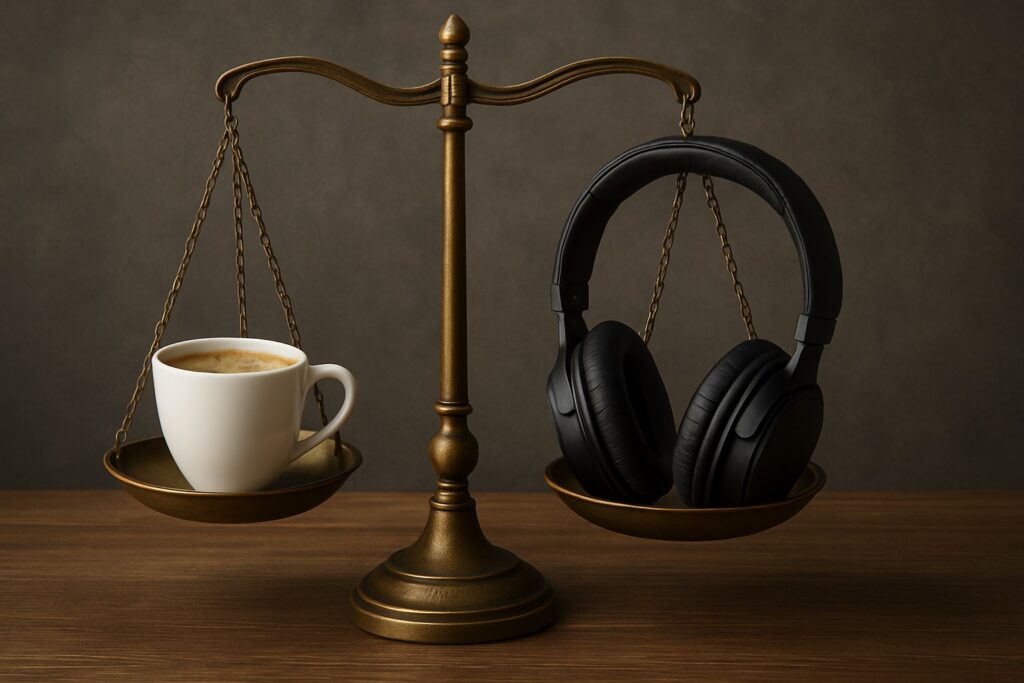In the rhythm of the 21st century, we live between the coffee machine and the headphones. One hand reaches for a cup of espresso, the other—for a playlist. When fatigue presses down on the eyelids, when the mind drifts into laziness, we choose a stimulant. But can music—this invisible energy of rhythms and harmonies—compete with coffee, the chemistry that pulses through our veins from the very first sip?
Let us explore the answer not on the level of personal preference, but through the lens of neurotransmitters and brain reactions.
Coffee: A Chemical Weapon Against Fatigue
Caffeine is an alkaloid that blocks adenosine receptors—a neurotransmitter that signals fatigue. When these receptors are temporarily disabled, the brain “believes” it’s not time to slow down. As a result:
-
Dopamine levels rise,
-
The cerebral cortex is activated,
-
The heart beats faster,
-
Alertness and reaction time increase.
But this effect comes with a price: decreased receptor sensitivity, habituation, and dependence. An “energy debt” forms—the more coffee you consume, the deeper the crash that follows.
Music and Dopamine: A Different Route to Arousal
Music also activates the dopamine system, but unlike coffee, it doesn’t trick receptors—it works through emotional feedback. Listening to favorite tracks stimulates the “reward system,” particularly the ventral tegmental area (VTA) and nucleus accumbens.
Under the influence of music:
-
Mood improves,
-
Motivation increases,
-
Concentration deepens.
This has been confirmed by fMRI studies showing that music induces similar dopamine-related activity as favorite foods or sexual pleasure.
Serotonin and Music: The Antidepressant Effect
Music can also influence serotonin levels—the neurotransmitter of well-being, calm, and stability. This is especially noticeable when listening to slow instrumental music or natural sounds (ocean, rain, forest).
Studies show that:
-
Slow music reduces heart rate,
-
Normalizes breathing,
-
Stabilizes mood.
All this creates a state of “calm energy”—not arousal, but deep focus. This effect is the opposite of caffeine’s stimulation and is often more beneficial for long-term mental work.
Norepinephrine: Stimulation Without Anxiety
Norepinephrine is responsible for attention and readiness for action. An increase creates a sense of “focused tension.” Caffeine rapidly elevates norepinephrine levels, but often excessively—leading to anxiety, sweating, or heart palpitations.
Music, by contrast, acts more gently. For instance, electronic music with a moderate tempo (like future garage or soft techno) gradually increases norepinephrine activity without overwhelming the system. This creates the ideal mode for focused work without stress.
Cortisol: The Antagonist of Focus
Cortisol is the stress hormone. High cortisol disrupts attention, hinders memory, and causes emotional instability. This is where music reveals itself as a natural antidote.
Studies show that:
-
Music lowers cortisol levels within 10–15 minutes of listening,
-
Even passive background listening reduces stress responses,
-
Hospital patients who listen to music have lower blood pressure and anxiety.
Coffee, by contrast, increases cortisol—especially when consumed on an empty stomach. So if you’re already tense, music—not coffee—may be the better choice.
The Time Effect: Sudden Spike or Deep Wave
Caffeine acts quickly. Within 15–30 minutes of consumption, it peaks in the bloodstream. You feel a surge of energy that lasts 2–4 hours, followed by a drop. It’s like a wave that lifts and then crashes.
Music, on the other hand, works more smoothly. It tunes rather than jolts. It creates an atmosphere, a rhythm, an environment in which body and mind enter a flow state. In this state, time fades, action deepens, and focus stabilizes.
Psychophysiological Adaptation
With frequent coffee use, the body adapts: sensitivity to caffeine decreases, and larger doses are required for the same effect. This leads to dependence, withdrawal symptoms, and poor sleep quality.
Music doesn’t create physical addiction, but it can become a powerful habit. Even better—the brain adapts to certain sound environments, forming conditioned responses that help you enter work or study mode faster. You can use this consciously—by building a focus playlist.
Impact on Sleep: Ally or Enemy?
Coffee after 3 PM is a risk to deep sleep. Caffeine blocks adenosine and disrupts the transition into slow-wave sleep phases. This means not only less sleep, but lower quality sleep.
Music, especially slow and instrumental, does the opposite: it improves falling asleep and increases time spent in deep sleep. It encourages relaxation, synchronizes brainwaves with slower rhythms, and reduces night awakenings.
Music as an Adaptive Stimulant
The uniqueness of music lies in its flexibility. While coffee has a single main effect (stimulation), music is a multifaceted tool. It can:
-
Energize (rhythmic electronic, rock),
-
Calm (ambient, classical),
-
Sustain tempo (lo-fi, chillhop),
-
Improve emotional tone (jazz, indie),
-
Enhance focus (white and pink noise).
This makes music adaptive—it adjusts to your needs in the moment. When you’re tired, it lifts you. When you’re tense, it soothes. When you’re scattered, it gathers your attention.
Practical Tips: How to Build a “Smart” Playlist
-
Define your goal. Work, study, relaxation—each requires its own rhythm.
-
Choose instrumental music for deep work. Lyrics interfere with verbal focus.
-
Rhythm matters. For focus: 60–80 BPM. For energy: 100–120 BPM.
-
Avoid tracks that are too familiar or too new. Familiar ones may trigger nostalgia; new ones—curiosity.
-
Create a ritual. The same music before work or study builds a mental anchor.
Conclusion: A Complement, Not a Replacement
Can music replace coffee? In the literal sense—no. It doesn’t block adenosine or trigger the same pathways instantly. But in a broader sense—yes. It stimulates the brain through a gentler path, with no side effects. It aligns, not agitates. It leads, not pushes.
Music is a café with no barista, no caffeine, no bill. But with an effect that lasts longer and runs deeper. Within it lies the power of rhythm, self-understanding, and a subtle neurochemistry we often underestimate.
So perhaps, instead of another espresso—press “play.”
Further Reading and Sources:
-
Chanda, M. L., & Levitin, D. J. (2013). The neurochemistry of music.
-
Ferreri, L. et al. (2019). Dopamine modulates the reward experiences elicited by music.
-
Smith, A. (2002). Effects of caffeine on human behavior.
-
Thoma, M. V. et al. (2013). The effect of music on the human stress response.
-
Salimpoor, V. N. et al. (2011). Anatomically distinct dopamine release during anticipation and experience of peak emotion to music.

